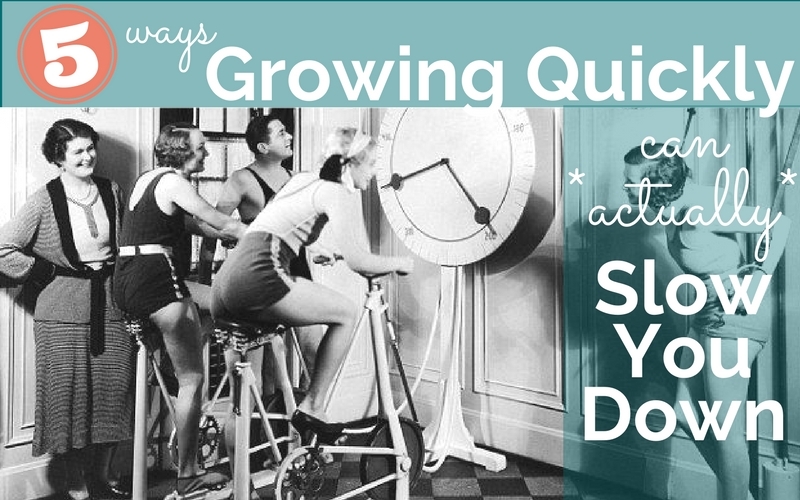
If you know us at all, you'd probably guess that the old “Greed is good” mantra never held much water with us. Not only because greed is Ew!, but it just doesn't have a place in the small business owner's life.
You don't start your own home-based online retail business out of greed. You do it because you want to be in charge of your own career path, to have freedom to travel throughout the year, to enjoy the flexibility of time with your family…you get the picture.
So maybe instead we'd say “Growth is good.” That's a no-brainer, right? If you're doing better this year than you were last year, that's the gold standard, right?
Well…not always. Sometimes growth isn't all good.
In fact, sometimes rapid growth can actually slow your business down.
[Tweet “Sometimes rapid growth can actually slow your business down. Here's how:”]5 Ways Quick Growth Can Slow You Down
#1 Not managing your inventory well
If you've been in business for a few years, chances are good that you've got some inventory sitting around. Inventory always depreciates over time, and if you're an Amazon seller, you're also looking at a higher seller fee after six months.
Yes, you may have to sell your inventory for less than you paid for it, but come on–isn't that better than seeing 0 return on what you paid for it?
Remember, once an item has broken even, you'll start losing money even faster. So throw up that discount sticker and get that inventory moving!
[Tweet “Wouldn't you rather sell your item for a discount than get 0 return on it? Time to liquidate!”]#2 Debt catching up with you
Leveling up sometimes means taking out a loan, right? Not so fast. We definitely caution people against doing the quick-and-dirty bridge loan that Amazon (and other providers) make oh so easy. (Check out our recent blog post for the lowdown on how these fast cash loans can come back to bite you.)
But even if you just borrowed money from a family member, or took it out of your vacation fund, what are you doing to repay it? If you don't have a plan to put that money back where it came from, your growth definitely doesn't mean as much as you thought.
[Tweet “So you borrowed money to level up your biz…what are you doing TODAY to repay?”]#3 Unnecessary stuff
When you're super-focused on growth, it's easy to forget to take a critical look at the base you're standing on. You could be paying for software you don't use, wasting time on systems that don't work, or simply underutilizing the resources you have. Why keep paying for it, if it's not delivering value? Taking a pause to trim the fat means moving forward at lightning speed.
#4 Failing to set goals
This is possibly the easiest thing to miss when you're focused on growing. I mean, when growth is the goal, what else is there to worry about? But again, if you don't have specific goals for your growth, all you're going to do is spread yourself out in every direction…and we all know what it feels like to be overextended.
[Tweet “There's a hidden cost to not setting goals. Find out what it is:”]#5 Dragging your morale
This is the dark side of not setting goals. You put a lot of time and effort into your business and when you expect to see certain numbers…and don't…it can really take the wind out of your sails. The only thing that sucks more than not making a solid profit is believing that you were making a solid profit.
If we're honest, this is what we hate more than anything–seeing dynamic online businesses falling short of their amazing potential, and seeing their amazing owners get discouraged and doubt themselves when this happens.
(Full disclosure: That's why we've designed our entire business around supporting small business owners, not just with crackerjack CPA services but also with strategic financial coaching tailored for the small/online business model…so this never has to happen and you always exceed your own expectations.)
The Bottom Line
It's never too late (nor too early!) for a reset. If you want 2017 to be the year where you pocket more profit and have more fun than ever before…both in your business and outside of it…take some time to do a year-over-year comparison, create incremental challenges for yourself, and make sure you're pointed in the right direction.
